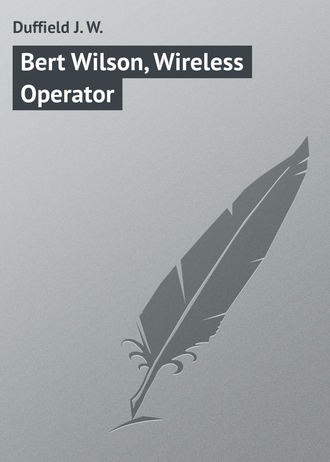 полная версия
полная версияBert Wilson, Wireless Operator
“Yes,” rejoined Bert, “and Edison and Tesla would have kept him company. But now clear out, you fellows, and let me play with this toy of mine. I want to get next to all its quips and quirks and cranks and curves, and I can’t do it with you dubs talking of poets and witches. Skip, now,” and he laughingly shooed them on deck.
Left to himself, he went carefully over every detail of the equipment. Everything – detector, transmitter, tuning coil and all the other parts – were subjected to the most minute and critical inspection, and all stood the test royally. It was evident that no niggardly consideration of expense had prevented the installation of the latest and best materials. Bert’s touch was almost caressing, as he handled the various parts, and his heart thrilled with a certain sense of ownership. There had been a wireless plant at one of the college buildings, and he had become very expert in its use; but hundreds of others had used it, too, and he was only one among many. Moreover, that plant had filled no part in the great world of commerce or of life, except for purposes of instruction. But this was the real thing, and from the time the steamer left the wharf until, on its return, it again swung into moorings, he would be in complete control. How many times along the invisible current would he feel the pulsing of the world’s heart; what messages of joy or pain or peril would go from him or come to him, as he sat with his finger on the key and the receiver at his ear! He stood on the threshold of a new world, and it was a long time before he tore himself away, and went to rejoin his friends on the upper deck.
A young man, whose figure had something familiar about it was pacing to and fro. Bert cudgeled his memory. Of whom did it remind him? The young man turned and their eyes met. There was a start of recognition.
“Why, this must be Bert Wilson,” said the newcomer, extending his hand.
“Yes,” replied Bert, grasping it warmly, “and you are Ralph Quinby or his double.”
“Quinby, sure enough,” laughed Ralph, “and delighted to see you again. But what on earth brings you here, three thousand miles from home?”
“I expect to be twelve thousand miles from home before I get through,” answered Bert; and then he told him of his engagement as wireless operator for the voyage.
“That’s splendid,” said Ralph, heartily. “We’ll have no end of fun. I was just feeling a bit down in the mouth, because I didn’t know a soul on board except the captain. You see, my father is manager of the line, and he wanted me to take the trip, so that I could enlarge my experience and be fit to step into his shoes when he gets ready to retire. So that, in a way, it’s a pleasure and business trip combined.”
“Here are some other fellows you know,” remarked Bert, as he beckoned to Tom and Dick who came over from the rail.
They needed no introduction. A flood of memories swept over them as they shook hands. They saw again the automobile race, when Ralph in the “Gray Ghost” and Bert at the wheel of the “Red Scout” had struggled for the mastery. Before their eyes rose the crowded stands; they heard the deafening cheers and the roar of the exhausts; they saw again that last desperate spurt, when, with the throttle wide open, the “Red Scout” had challenged its gallant enemy in the stretch and flashed over the line, a winner.
That Ralph remembered it too was evident from the merry twinkle in his eyes, as he looked from one to the other of the group.
“You made me take your dust that day, all right,” he said, “but I’ve never felt sore over that for a minute. It was a fair and square race, and the best car and the best driver won.”
“Not on your life,” interjected Bert, warmly. “The best car, perhaps, but not the best driver. You got every ounce of speed out of your machine that anyone could, and after all it was only a matter of inches at the finish.”
“Well, it was dandy sport, anyway, win or lose,” returned Ralph. “By the way, I have the ‘Gray Ghost’ with me now. It’s crated up on the forward deck, and will be put down in the hold to-morrow. So come along now, and take a look at it.”
There, sure enough, was the long, powerful, gray car, looking “fit to run for a man’s life,” as Ralph declared, while he patted it affectionately.
“I thought I’d bring it along,” he said, “to use while we are in port at our various stopping places. It will take a good many days to unload, and then ship our return cargo, and, if the roads are good, we’ll show the natives some new wrinkles in the way of fancy driving. We’re all of us auto fiends, and I want you to feel that the car is as much yours as mine, all through the trip. That is,” he added, mischievously, “if you fellows don’t feel too haughty to ride in a car that you’ve already beaten.”
With jest and laughter, the time passed rapidly. The evening deepened, and a hush fell over the waters of the bay. Lanterns twinkled here and there like fireflies among the shipping, while from an occasional boat rose the tinkling of a banjo or guitar. From the shore side came the night sounds of the great city, sitting proudly on her many hills and crowned with innumerable lights. Silence gathered over the little group, as they gazed, and each was busy with his own thoughts. This loved land of theirs – by this time to-morrow, it would be out of sight below the horizon. Who knew when they would see it again, or through what perils they might pass before they once more touched its shores? It was the little shiver before the plunge, as they stood upon the brink of the unknown; and they were a trifle more quiet than usual, when at last they said good-night and sought forgetfulness in sleep.
CHAPTER III
A Startling Message
The next morning, all was stir and bustle on board the steamer. The great cranes groaned, as they hoisted aboard the last of the freight, and lowered it into the hold, that gaped like a huge monster, whose appetite could never be satiated. Men were running here and there, in obedience to the hoarse commands of the mates, and bringing order out of the apparent confusion. The pier and decks were thronged with friends and relatives of the passengers, come to say good-by to those who seemed to become doubly dear, as the hour of parting drew near. The cabins were piled with flowers that, under the inexorable rules of sea-going ships, would have to be thrown overboard, as soon as the vessel had cleared the harbor. Everywhere there were tears and smiles and hand grasps, as friends looked into each other’s eyes, with the unspoken thought that the parting “might be for years, or it might be forever.”
The boys had risen early, and, after a hearty breakfast, had come on deck, where they watched with keenest zest the preparations for the start. It was a glorious day and one that justified all they had heard of the wonderful California climate. The sun was bright, but not oppressive, and a delightful breeze blew up from the bay. The tang of the sea was in their nostrils, and, as they gazed over the splendid panorama spread out before them, their spirits rose and their hearts swelled with the mere joy of living. The slight melancholy of the night before had vanished utterly, and something of the old Viking spirit stirred within them, as they sniffed the salt breeze and looked toward the far horizon where the sky and waves came together. They, too, were Argonauts, and who knew what Golden Fleece of delight and adventure awaited their coming, in the enchanting empires of the East, or in the
“Summer isles of Eden, lyingIn dark purple spheres of sea.”As they stood at the rail, filling their lungs with the invigorating air, and watching the animated scenes about them, Ralph came up to them, accompanied by an alert, keen-eyed man, whom he introduced as his father.
He shook hands cordially with the boys, but when he learned that Dick and Tom, as well as Bert, were all students in the college from which he had himself graduated, his cordiality became enthusiasm. He was one of the men who, despite the passing of the years and the growth of business cares, remain young in heart, and he was soon laughing and chatting as gaily as the boys themselves. There was nothing of the snob about him, despite his wealth and prominence, and, in this respect Ralph was “a chip of the old block.”
“So you are the Wilson whose fadeaway ball won the pennant, are you?” as he turned to Bert. “By George, I’d like to have seen that last game. The afternoon that game was played, I had the returns sent in over a special wire in my office. And when you forged ahead and then held down their heavy hitters in the ninth, I was so excited that I couldn’t keep still, but just got up and paced the floor, until I guess my office force thought I was going crazy. But you turned the trick, all right, and saved my tottering reason,” he added, jovially.
The boys laughed. “It’s lucky I didn’t know all that,” grinned Bert, “or I might have got so nervous that they would have knocked me out of the box. But since you are so interested, let me show you a memento of the game.” And running below, he was back in a minute with the souvenir presented to him by the college enthusiasts.
It was a splendid gift. The identical ball with which he had struck out the opposing team’s most dangerous slugger in the ninth had been encased in a larger ball of solid gold on which Bert’s name had been engraved, together with the date and score of the famous game. Now it was passed from hand to hand amid loud expressions of admiration.
“It’s certainly a beauty,” commented Mr. Quinby, “and my only regret is that I wasn’t called upon to contribute toward getting it. I suppose it will be rather hard on you fellows,” he went on, “to have to go without any baseball this summer. If I know you rightly, you’d rather play than eat.”
“Oh, well,” broke in Ralph, “they may be able to take a fling at it once in a while, even if they are abroad. It used to be the ‘national’ game, but it is getting so popular everywhere that we’ll soon have to call it the ‘international’ game. In Japan, especially, there are some corking good teams, and they play the game for all it is worth. Take the nine of Waseda University, and they’d give Yale or Princeton all they wanted to do to beat them. Last year, they hired a big league star to come all the way from America, to act as coach. They don’t have enough ‘beef,’ as a rule, to make them heavy sluggers, but they are all there in bunting and place hitting, and they are like cats on the bases.”
“Yes,” said Dick, “and, even leaving foreigners out of the question, the crews from Uncle Sam’s warships have what you might call a Battleship League among themselves, and every vessel has its nine. Feeling runs high when they are in port, and the games are as hotly contested as though a World’s Series were in question. I’m told that, at the time of the Boxer rebellion, there were some dandy games played by our boys right under the walls of Peking.”
Just here the captain approached, and, with a hearty handshake and best wishes for the journey, Mr. Quinby went forward with him to discuss business details connected with the trip.
Ten o’clock, the hour set for starting, was at hand. The first bell, warning all visitors ashore, had already rung. The last bale of freight had been lowered into the hold and the hatches battened down. There was the usual rush of eleventh hour travelers, as the taxis and cabs rattled down to the piers and discharged their occupants. All the passengers were on the shore side of the vessel, calling to their friends on the dock, the women waving their handkerchiefs, at one moment, and, the next, putting them to their eyes. The last bell rang, the huge gangplank swung inward, there was a tinkling signal in the engine room and the propellers began slowly to revolve. The steamer turned down the bay, passed the Golden Gate where the sea lions sported around the rocks, and out into the mighty Pacific. The voyage of the Fearless had begun.
Down in the wireless room, Bert had buckled to his work. With the telephone receiver held close to his ears by a band passing over his head, he exchanged messages with the land they were so rapidly leaving behind them, with every revolution of the screws. Amid the crashing of the sounder and the spitting blue flames, he felt perfectly in his element. Here was work, here was usefulness, here was power, here was life. Between this stately vessel, with its costly cargo and still more precious freight of human lives, and the American continent, he was the sole connecting link. Through him alone, father talked with son, husband with wife, captain with owner, friend with friend. Without him, the vessel was a hermit, shut out from the world at large; with him, it still held its place in the universal life.
But this undercurrent of reflection and exultation did not, for a moment, distract him from his work. The messages came in rapidly. He knew they would. The first day at sea is always the busiest one. There were so many last injunctions, so many things forgotten in the haste of farewell, that he was taxed to the utmost to keep his work well in hand. Fortunately he was ambidextrous, could use his left hand almost as readily as his right, and this helped him immensely. From an early age, more from fun than anything else, he had cultivated writing with either hand, without any idea that the day would come when this would prove a valuable practical accomplishment. Now with one finger on the key, he rapidly wrote down the messages with the other, and thus was able to double the rapidity and effectiveness of his work.
Before long there was a lull in the flood of messages, and when time came for dinner, he signaled the San Francisco office to hold up any further communications for an hour or so, threw off his receiver, and joined his friends at the table.
“Well, Bert, how does she go?” asked Dick, who sat at his right, while Tom and Ralph faced them across the table.
“Fine,” answered Bert, enthusiastically. “It isn’t work; it’s pleasure. I’m so interested in it that I almost grudge the time it takes to eat, and that’s something new for me.”
“It must be getting serious, if it hits you as hard as that,” said Tom, in mock concern. “I’ll have to give the doctor a tip to keep his eye on you.”
“Oh, Bert just says that, so that when he gets seasick, he’ll have a good excuse for not coming to meals,” chaffed Ralph.
“Well, watch me, fellows, if you think my appetite is off,” retorted Bert, as he attacked his food with the avidity of a wolf.
“By the way,” asked Dick, “what arrangements have you made for any message that may come, while you are toying with your dinner in this languid fashion?”
“I’ve told the San Francisco man to hold things up for a while,” replied Bert. “That’s the only station we’re likely to hear from just now, and the worst of the rush is over. After we get out of range of the land stations, all that we’ll get will be from passing ships, and that will only be once in a while.”
“Of course,” he went on, “theoretically, there ought to be someone there every minute of the twenty-four hours. You might be there twenty-three hours and fifty-nine minutes, and nothing happen. But, in the last minute of the twenty-fourth hour, there might be something of vital importance. You know when that awful wreck occurred last year, the operator was just about to take the receiver from his head, when he caught the call. One minute later, and he wouldn’t have heard it and over eight hundred people would have been lost.”
“I suppose,” said Ralph, “that, as a matter of fact, there ought to be two or three shifts, so that someone could be on hand all the time. I know that the Company is considering something of the kind, but ‘large bodies move slowly,’ and they haven’t got to it yet.”
“For my part,” chimed in Tom, “I should think that with all the brains that are working on the subject, there would have been some way devised to make a record of every call, and warn the operator at any minute of the day or night.”
“They’re trying hard to get something practical,” said Bert. “Marconi himself is testing out a plan that he thinks will work all right. His idea is to get a call that will be really one long dash, so that it won’t be confounded with any letter of the alphabet. He figures on making this so strong that it will pass through a very sensitive instrument with sufficient force to ring a bell, that will be at the bedside of the operator.”
“Rather rough on a fellow, don’t you think?” joined in the ship’s doctor. “If he were at all nervous, he might lie there awake, waiting for the bell to ring. It reminds me of a friend of mine, who once put up at a country hotel. He was told that the man who slept in the next room was very irritable and a mere bundle of nerves. He couldn’t bear the least noise, and my friend promised to keep it in mind. He was out rather late that night, and when he started to retire he dropped one of his shoes heavily on the floor. Just then he remembered his nervous neighbor. He went on undressing quietly, walked about on tiptoe, put out the light, and crept into bed. Just as he was going off to sleep, a voice came from the other room: ‘Say, when in thunder are you going to drop that other shoe?’”
“In the meantime,” went on Bert, when the laugh had subsided, “they’ve got an ingenious device on some of the British ships. It seems rather cruel, because they have to use a frog. You know how sensitive frogs are to electricity. Well, they attach a frog to the receiving end, and under him they put a sheet of blackened paper. As the dots and dashes come in, the current jerks the frog’s legs over the paper. The leg scrapes the black away, and leaves white dots and dashes. So that you can pick up the paper and read the message just like any other, except that the letters are white instead of black.”
“Poor old frogs,” said Ralph. “If they knew enough, they’d curse the very name of electricity. Galvani started with them in the early days, and they’ve still got to ‘shake a leg’ in the interest of science.”
“Yes,” murmured Tom, “it’s simply shocking.”
He ducked as Ralph made a playful pass at him.
“There’s been quite a stir caused by it,” went on Bert, calmly ignoring Tom’s awful pun, “and the humane societies are taking it up. The probability is that it will be abolished. It certainly does seem cruel.”
“I don’t know,” said the doctor. “Like many other questions, there are two sides to it. We all agree that no pain should be inflicted upon poor dumb animals, unless there is some great good to be gained by it. But it is a law of life that the lesser must give way to the greater. We use the cow to get vaccine for small-pox, the horse to supply the anti-toxin for diphtheria. Rabbits and mice and guinea-pigs and monkeys we inoculate with the germs of cancer and consumption, in order to study the causes of these various diseases, and, perhaps, find a remedy for them. All this seems barbarous and cruel; but the common sense of mankind agrees that it would be far more cruel to let human beings suffer and die by the thousands, when these experiments may save them. If the twitching of a frog’s leg should save a vessel from shipwreck, we would have to overlook the frog’s natural reluctance to write the message. I hope, though,” he concluded, as he pushed back his chair, “that they’ll soon find something else that will do just as well, and leave the frog in his native puddle.”
When they reached the deck, they found that the breeze had freshened, and, with the wind on her starboard quarter, the Fearless was bowling along in capital style. Her engines were working powerfully and rhythmically, and everything betokened a rapid run to Hawaii, which the captain figured on reaching in about eight days. The more seasoned travelers were wrapped in rugs and stretched out in steamer chairs, but many of the others had already sought the seclusion of their staterooms. It was evident that there would be an abundance of empty seats at the table that evening.
Throughout the rest of the day the messages were few and far between. Before that time next day, they would probably have ceased altogether as far as the land stations were concerned, and from that time on until they reached Hawaii, the chief communications would be from passing ships within the wireless range.
The boys were gathered in the wireless room that night, telling stories and cracking jokes, when suddenly Bert’s ear caught a click. He straightened up and listened eagerly. Then his face went white and his eyes gleamed with excitement. It was the S. O. S. signal, the call of deadly need and peril. A moment more and he leaped to his feet.
“Call the captain, one of you fellows, quick,” he cried.
For this was the message that had winged its way over the dark waste of waters:
“Our ship is on fire. Latitude 37:12, longitude 126:17. For God’s sake, help.”
CHAPTER IV
The Flaming Ship
The captain came in hurriedly and read the message. He figured out the position.
“She’s all of sixty miles away,” he said, looking up from his calculation, “and even under forced draught we can’t reach her in less than three hours. Tell her we’re coming,” he ordered, and hurried out to give the necessary directions.
The course of the ship was altered at once, the engines were signaled for full speed ahead, and with her furnaces roaring, she rushed through the night to the aid of her sister vessel, sorely beset by the most dreaded peril of the sea.
In the mean time Bert had clicked off the message: “We’ve got you, old man. Ship, Fearless, Captain Manning. Longitude 125:20, latitude 36:54. Will be with you in three hours. Cheer up. If you’re not disabled, steam to meet us.”
Quickly the answer came back: “Thank God. Fighting the fire, but it’s getting beyond us. Hasn’t reached the engine room yet, but may very soon. Hurry.”
In short, jerky sentences came the story of the disaster. The steamer was the Caledonian, a tramp vessel, plying between Singapore and San Francisco. There was a heavy cargo and about forty passengers. A little while since, they had detected fire in the hold, but had concealed the fact from the passengers and had tried to stifle it by their own efforts. It had steadily gained, however, despite their desperate work, until the flames burst through the deck. A wild panic had ensued, but the captain and the mates had kept the upper hand. The crew had behaved well, and the boats were ready for launching if the worst came to the worst. The fire was gaining. “Hurry. Captain says – ”
Then the story ceased. Bert called and called again. No answer. The boys looked at each other.
“The dynamo must have gone out of commission,” said Bert. “I can’t get him. The flames may have driven him out of the wireless room.”
All were in an agony of suspense and fear. It seemed as though they crept, although the ship shook with the vibration of its powerful engines, working as they had never worked before. The Fearless was fairly flying, as though she knew the fearful need of haste.
Outside of the wireless room, none of the passengers knew of the disaster. Most of them had retired, and, if the few who were still up and about sensed anything unusual, the discipline of the ship kept questions unspoken. All the officers and the crew, however, were on the alert and tingling with the strain, and every eye was turned toward the distant horizon, to catch the first glimpse of the burning vessel.
Out into the night, Bert sent his call desperately, hoping to raise some other ship nearer to the doomed steamer than the Fearless, but in vain. He caught a collier, three hundred miles away, and a United States gunboat, one hundred and sixty miles distant, but, try as he would, there was nothing nearer. Nobody but themselves could attempt the rescue. Of course, there was the chance that some sailing vessel, not equipped with wireless, might come upon the scene, but this was so remote that it could be dismissed from consideration.
More than half the distance had been covered when Dick, who had stepped outside, came running in.
“Come on out, fellows,” he cried, excitedly. “We can see a light in the sky that we think must come from the fire.”
They followed him on the run. There, sure enough, on the distant horizon, was a deep reddish glow, that seemed to grow brighter with every passing moment. At times, it waned a trifle, probably obscured by smoke, only to reappear more crimson than ever, as the vessel drew nearer.








